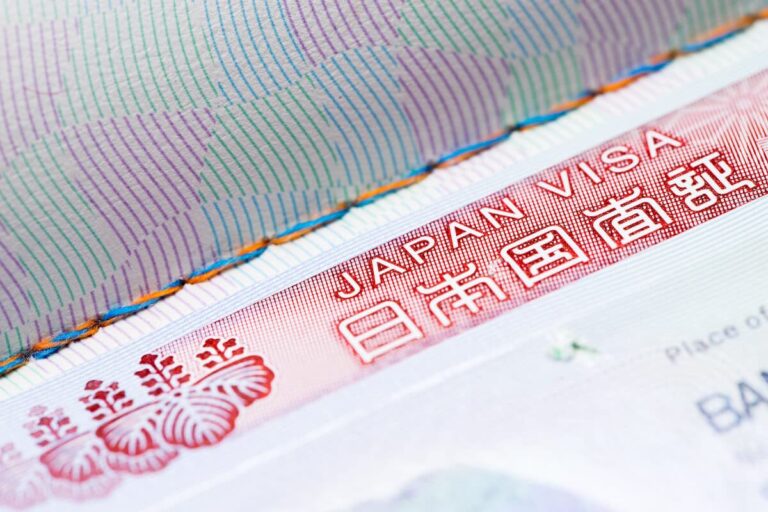Japan draws visitors from around the globe with its delicious cuisine, rich history, beautiful cherry blossoms, and unique culture. This island nation is also popular with foreign workers. Due to special labor force needs, certain international workers have many options for growing their careers in Japan.
You’ll need a Japanese visa for workers to make such a move. This visa gives permission from the Japanese government to enter the country for the specific purpose stated in the visa. It is crucial to gather all necessary documents, such as proof of employment, financial stability, and any required qualifications, during the application process. If you’re considering moving to Japan in 2025, it is advisable to start planning early to ensure all paperwork is submitted on time. Additionally, being aware of cultural norms and language can significantly enhance your experience in Japan.
This article, created by our team here at Remitly, will look at the different kinds of Japanese work visas and what you need to do to obtain them. We’ll also review the documents and information the Japanese Immigration Services Agency requests with your application.
What kind of Japan work visa do you need?
Different visas allow you to stay in Japan for different lengths of time. Your work background, language skills, and career goals will affect what foreigners, like Americans living in Japan, can do for employment in the country. These factors also affect how long you can remain in the country.
Here are the most common Japanese visa types for foreign workers:
- Engineer/Specialist in humanities/international services: A very broad visa category that includes English teachers and information technology (IT) specialists, roles that are popular with foreign workers in Japan
- Artist: For composers, artists, sculptors, photographers, and creatives in similar roles
- Journalist: A visa for those working in print or video media
- Entertainer: Dancers, singers, athletes, models, musicians, and other entertainers can work in Japan with this visa
- Specified skills: A broad visa for foreign nationals working for companies that have difficulty hiring Japanese nationals in specific fields.
- Researcher: For individuals conducting research for a Japanese company or research institute
- Professor: For someone who will be teaching or helping to teach at a Japanese college or university
- Intra-company transferee: A designation for people who currently work for an employer with offices in Japan and then get transferred to an office in Tokyo or one of Japan’s other cities
- Instructor: For teachers at the elementary, middle school, or secondary level in the Japanese education system at a public school or one of the country’s private international schools
- Business manager: For people working in Japan as company presidents, directors, etc.
- Legal/accounting services: For lawyers, accountants, and similar who are certified in Japan and may include being certified as a registered lawyer under the law of a foreign country
- Medical services: Doctors, nurses, dentists, and similar who are certified under Japanese law
Getting a job
Don’t make travel arrangements to Tokyo just yet. As a rule, foreign workers have to find, interview for, and then be offered a job before they can apply for a workers’ visa.
You read that right. You can begin the visa application process only after you have a job offer. Your Japanese employer will likely assist you with the process.
How do I find job opportunities in Japan?
Here are some tips for finding Japanese jobs.
Check online listings
Online job postings are a great way to find openings at companies in Japan. You’ll typically find the most jobs in the capital city of Tokyo and in other big cities like Yokohama, Osaka, and Nagoya.
Jobs for foreigners are less common in the Japanese countryside except in popular tourist destinations like Yoshino and Shirawaka.
Learn to speak Japanese
The majority of Japanese people don’t speak English, so being able to communicate in the local language is essential to Japanese life. Learning Japanese can help open the doors to more employment opportunities and allow you to communicate with Japanese people during the hiring process and in the workplace.
Become familiar with Japanese culture in the workplace
Japanese people have their own cultural norms and traditions. Reading articles about workplace culture can help you make a good impression during your job search.
What’s the process for getting a Japan work visa?
Preparation is key. To work in Japan, you’ll need to follow a specific process. Be sure to get started before you arrive in the country, as the process of getting a Japan work visa can take as long as a few months.
Once you have a job offer and know the visa you need, the next best step is to consult with your nearest Japanese embassy or consulate. They’ll be able to tell you about up-to-date requirements and timelines. You can use this directory to find the diplomatic office that serves your area.
Note that the procedure and required documents will differ slightly based on the visa type you seek. For instance, if you are applying for a student visa, you may need to provide proof of enrollment and financial support. Conversely, the M1 visa application process may require additional documentation related to vocational training or non-academic programs. Be sure to review the specific requirements for each visa category to ensure a smooth application experience.
The process described here will cover most types of Japan work visas. If you get different information from the Japanese government or an embassy, of course, follow those instructions.
1. Get a Certificate of Eligibility (COE) from the Immigration Services Agency.
First, you will need to obtain a Certificate of Eligibility (COE) to receive your visa.
This needs to be done in Japan. In most cases, the company that offered you a job will send a representative to the Regional Immigration Bureau in their area to get it done for you.
The importance of this step can’t be emphasized enough. You need to get the COE to get your visa.
2. Apply to the Japanese embassy for your official visa.
Once you have the COE, you’re ready to begin applying for the visa by following these steps.
Download a visa application form
Download a visa application form from the Ministry of Foreign Affairs website. Fill out that form and obtain the necessary photograph referenced in the application. Depending on your home country, you may need to submit multiple photos.
Gather the necessary documents
Next, send your valid passport proof, along with the application, photo(s), and COE, to the Japanese embassy or consulate-general in your home country.
Note that if you are from China, you will also need the following documents:
- A copy of your Chinese family register
- A Temporary Residence Permit or Residence Certificate if you don’t have a copy of the family register from the proper location
Schedule an appointment
The embassy will process your application. If approved, they will paste your visa directly into your passport and mail it back to you.
Pay the necessary fees
Fees for workers’ visas vary depending on your country of origin. Consult this guide for the latest information about fees.
3. Obtain your residence card.
Once your visa has been issued, you must enter Japan within a certain time frame.
Generally, the valid time window is three months but look at your specific COE and visa.
Most foreign nationals entering Japan will be processed through Tokyo or Osaka, which have extensive immigration offices supporting multiple languages.
At the airport, you will be issued a residence card (在留カード) that indicates your approved period of stay in the country. As a matter of Japanese law, you must always carry this card with you.
If you leave Japan, you will need to keep this card with you and use it for re-entry into the country.
4. Keep your visa current.
Long-term stay visas are uncommon for foreign nationals recently moving to Japan. In most cases, the residence status granted by your visa will expire in a year.
About two or three months before that expiration date, visit your Regional Immigration Bureau to renew your status of residence and get a new residence card.
At that time, you and your employer may ask for a longer stay on your visa. This is generally left to the discretion of the Bureau.
As with the original visa application process, make sure you allow plenty of processing time.

Japanese working visa FAQs
If you still have questions about getting a workers’ visa in Japan, read on for answers.
How long is a Japanese work visa good for?
As mentioned above, visas for workers are typically issued for one year. You can generally renew your visa as long as you remain eligible for the program you were admitted through.
Can you work in Japan on a student visa?
In many cases, young people with a student visa can work part-time in Japan. When you complete your student visa application, ask the official at the embassy or consulate for more information about working while you study.
Can you work in Japan on a visitor visa?
A tourist visa isn’t intended for someone who is moving to Japan. Like many other countries, Japan doesn’t allow people who hold tourist visas to legally work during their stays.
Does Japan have a digital nomad visa?
Many countries around the world have introduced digital nomad visa programs that allow foreigners employed by companies in their home country to work remotely while living abroad. As of September 2023, Japan doesn’t offer this type of program.
Does Japan have a working holiday visa?
Young adults between the ages of 18 and 30 (or 25, depending on what country they’re from) may qualify for working holiday visas. This type of visa makes it possible for young people to earn money while vacationing in Japan. You can learn more about the working holiday visa program on this page.
Can my family members move with me if I get a Japanese working visa?
Family members aren’t automatically granted visas once you obtain a workers’ visa. Your spouse, children, and any other dependents will instead need to apply for a separate Dependent visa, which you can learn about on this page.
Can you get Japanese permanent residency with a working visa?
Receiving a workers’ visa doesn’t entitle you to permanent residency in Japan. Visas for workers are issued for a limited period and are renewable, provided that you continue to meet the requirements for the program.
To live in Japan permanently with a residency certificate, you’ll need to continue to work in the country for an extended period, usually around 10 years.
Japan will sometimes make an exception for individuals who qualify for a highly skilled professional visa. Through this program, some people can become permanent residents in as little as one year.
Is a work visa a path to Japanese citizenship?
A worker’s visa won’t immediately make you a Japanese citizen. However, the program does provide a pathway for those who want to become Japanese citizens in the future. Typically, you must live as a permanent resident in Japan for five years before you become eligible for citizenship.
Can you access the Japanese public healthcare system with a work visa?
Typically, access to the Japanese public healthcare system is available through employers, so most people who obtain workers’ visas will be able to receive care through public hospitals and clinics. Expats moving to Japan can also purchase private health insurance.
What’s the best way to send money to Japan?
When moving to Japan, you may need to send funds from overseas into your Japanese bank account to cover living costs like rent and purchases from shopping centers and department stores.
Remitly makes transferring money to Japan quick and affordable. Millions of customers use our app to make secure money transfers all over the world.
No matter what your money transfer needs, we can help you every step of the way in this exciting new chapter of your life. Download the Remitly app to get started.

